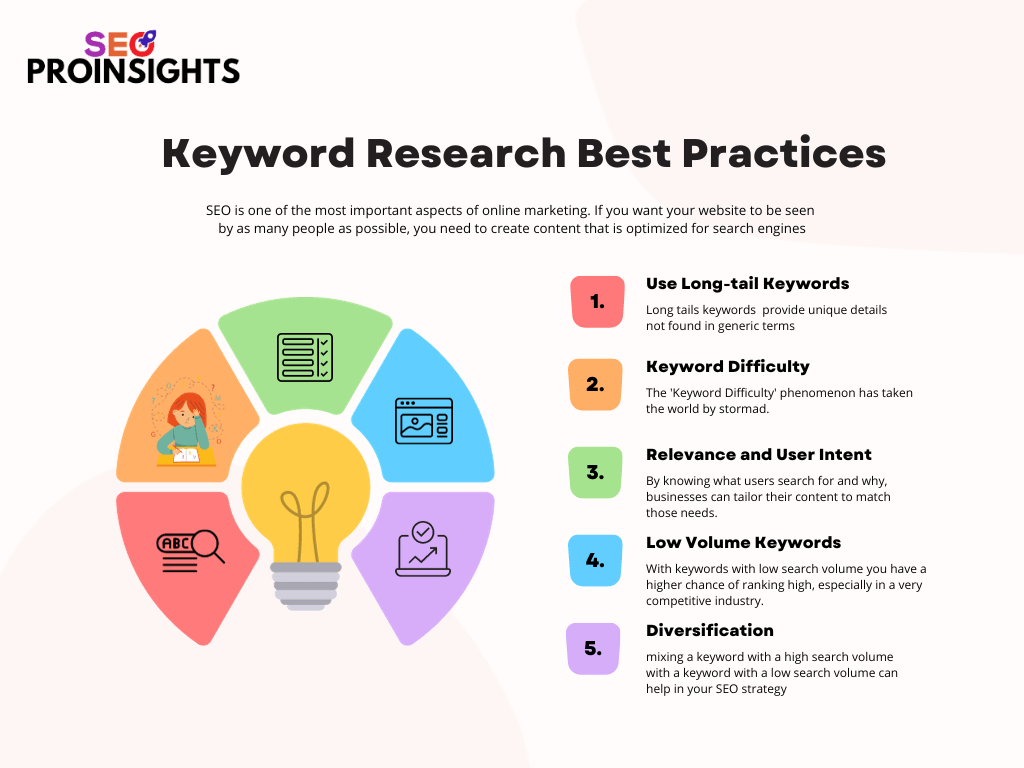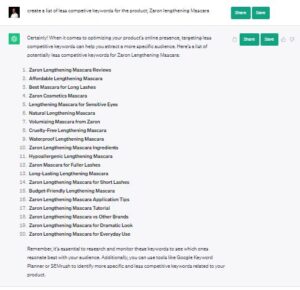In the vast online space where websites compete for attention on the first page of the Google search engine. One thing separates the successful ones from the unsuccessful ones is one tool and that tool is the KEYWORDS.
In the world of Search Engine Optimization, Keyword research is very important as it shapes your online success. Not just that, it is the foundation of any SEO or Search Engine Marketing (SEM) campaign.
To better understand the significance of keyword research for SEO success, businesses must realize that finding the right phrases or keywords that their target customers search online for when buying or looking for information.
This data can help businesses match their content, website, and advertising to what customers want. It’s like having a compass when navigating a ship – without it you can get lost in the vast online competition.
Exploring Keyword Research
In this article, you will gain a comprehensive understanding of keyword research and its significance, delve into the sub-sections: “What is keyword research?” and “Why is keyword research important?” Proven strategies and best keyword research practices.
Don’t forget to grab your notepad as we uncover in minute detail everything you need to know about the significance of keyword research to SEO success.
What is Keyword Research?
Keyword research is an essential part of On-Page SEO. Find out what keywords and phrases people are typing on search engines to find information or buy products online. When choosing keywords, choose keywords with high search volumes and low competition.
Optimize website content such as titles, headings, and meta descriptions to improve SERP rankings. User intent is also a key factor in keyword research. Understand the specific words people are using to search for information or products (if E-commerce) related to your industry.
This knowledge helps you tailor content to meet their needs and provide solutions. From experience, one of the top-ranking factor for SEO is keywords in the title tag and the meta description tags. This can significantly improve SERP rankings.
Why is Keyword Research Important for SEO?
Keyword research is key for any online business’s success. It lets you know what words and phrases people use when they are looking for products or services like yours. This way, you can get your website to show up more on search engine pages and get more people who are interested in what you offer.
By researching keywords, you gain understanding of what your target audience wants. This way, you can create content that is relevant and high quality, which will make people stay longer on your site and get you more organic traffic. Plus, you can also find out what your competitors are up to and make plans to beat them in the search engine rankings.
Now, let’s look back and see why keyword research is so important. In the past, there weren’t as many sophisticated searching engines as there are now. Websites used to stuff their pages with random keywords to try to show up more in search results – not good for the user experience.
To fix this, search engines started using algorithms to give users the most accurate and relevant results. They looked at user intent and content quality, instead of just keyword density. This meant websites had to do research to know how people were searching, which changed how websites were optimized and created modern SEO practices.
Benefits of Keyword Research
To optimize your content and improve your search engine ranking, keyword research is crucial. The benefits of keyword research include the following:
-
Boosts Click Through Rates
No doubt, when you target less competitive keywords to gain traffic to your website you have a chance of appearing on first page on Google SERPs. This can improve your click-through rates and impact the average position of your website.
When you write clear and concise meta titles and descriptions, it reflects the content on your webpage thereby improving clicks through rate on your website.
Adding power words and numbers can also improve your website click-through rates. Power words such as “Best”, “Affordable”, “Exclusive” e.t.c. Also numbers like recent years, actual list e.g 3 Reasons Why Keyword Research Is Important. All these can create a sense of urgency for people to click on your website
-
Improved Search Engine Ranking
Keyword research is key to a better search engine ranking. It helps find the words and phrases people are searching for online. We can analyze user intent and make content around these terms. Optimizing titles, meta descriptions, headings, and body content enables search engines to recognize the website’s relevance.
Businesses gain useful click-throughs by researching keywords regularly. Powerful insights can be used for SEO and marketing strategies. By using long-tail keywords with low competition but high relevance can rank higher on SERPs.
-
Targeted Traffic
When you target the right keywords for your products or services you get visitors that can be converted to leads, sales, or engaged users. This is possible when you capture a visitor’s email using a bait called the lead magnet. These visitors can be nurtured to become engaged users or returning customers.
Higher Conversion Rates: By concentrating on luring the correct audience, you can significantly boost your conversion rates and get better outcomes from your marketing campaigns.
Increased ROI: When your website gets targeted traffic, you anticipate a higher return on investment (ROI) since you are reaching potential customers instead of random visitors.
Enhanced User Experience: If visitors find pertinent content based on their search queries, they are more likely to have a positive experience on your website.
Better Search Engine Rankings: Targeted Traffic assists in enhancing your search engine rankings as search engines contemplate user engagement and relevancy when deciding the ranking positions.
Competitive Advantage: Having a steady flow of targeted traffic gives you an upper hand by escalating brand visibility and establishing authority in your niche.
Analyzing user behavior, optimizing marketing strategies, and tailoring content to meet the exact needs and interests of your audience can also be achieved through targeted traffic.
-
Content Optimization
Keyword research in SEO will help you make an informed decision on the content your audience would be interested in. You can create an article around these keywords to address their concerns, problems, and challenges.
With optimization, you can boost relevance, readability, and search engine rankings.
Let’s understand the importance of content optimization better by looking at its key factors:
| Keyword Research | Choose keywords that fit your target audience and use them strategically in your content. |
| Make titles attractive and accurately depict your content. | |
| Meta Description Optimization | Compose concise and catchy meta descriptions summarizing your page. |
| Organize your content with headings for easier understanding by readers and search engines. |
Generating top-notch content that suits the interests and needs of your target group. This will not only elevate the user experience but also inspire other websites to share and link to you.
Knowing the background of content optimization makes us appreciate it more. As search engine algorithms become more advanced, so does their definition of quality content. That’s why content optimization is now a staple for companies aiming to gain better visibility in search engine results.
How to Conduct Keyword Research
To conduct effective keyword research for your content strategy, dive into the section on “How to Conduct Keyword Research.” Discover the power of brainstorming relevant keywords, utilizing keyword research tools, and analyzing competitors’ keywords. These sub-sections provide solutions to enhance your keyword research process and optimize your content for maximum visibility and relevance.
-
Point#1: Brainstorming Relevant Keywords
If you want to get the most out of your content, it’s key to conduct keyword research. Here are some steps to help you out:
- Know who you’re targeting: Think about the interests and needs of your target audience. Generate keywords that would appeal to them.
- Research popular words: Use tools like Google Trends, Google Keyword Planner, Ahref or SEMrush to find popular words in your niche. Find ones with high search volumes and low competition.
- Check out competitors: See which words your competitors are using. This could give you ideas and let you spot untapped opportunities.
- Use long-tail: Long-tail keywords usually have lower search volumes but can bring in targeted traffic.
- Brainstorm variations: Create a list of potential words by looking for synonyms and variations of primary terms. It’ll help to diversify your content.
To maximize the benefits of keyword research, consider trends, local search queries, and user-generated content.
These steps will help you boost your online presence and get more organic traffic and leads. Start using them now!
-
Point#2: Using Keyword Research Tools
Keyword research tools can give you valuable information about the keywords your target audience is searching for. These tools provide data on search volume, competition level, CPC, keyword trends, and related keywords. With them, you can find high-volume keywords relevant to your niche with low competition. You can also track keyword trends to stay up-to-date with user behavior and adjust your SEO strategy.
Did you know? The use of keyword research tools started in the early 2000s, when search engines became popular. Marketers knew they had to optimize their websites for certain keywords to get more traffic. Since then, these tools have advanced a lot and are essential for successful digital marketing campaigns.
In further sections, we will delve into some of the best keyword research tools.
-
Point3#: Analyzing Competitors’ Keywords
Competitors’ keywords can be analyzed with a table that shows vital information. It includes the keywords, types, search volume, Difficulty, and ranking position. For example; A Case study of the Beauty Niche in Nigeria
| Competitor | Keywords | Keyword Type | Volume | Difficulty | Rank |
|---|---|---|---|---|---|
| Competitor A | Body lotions for glowing skin | Commercial | 1.6K | 52% | 1st |
| Competitor B | Moisturizer | Commercial | 3.6K | 76% | 27th |
| Competitor C | Simple Face wash | Informational & Transactional | 4.4K | 24% | 3rd |
Analyzing keyword data can help you identify high-volume keywords, but also those that align with your business goals and target audience.
This data was obtained by inputting the Competitor’s website into SEMrush
Best Practices for Keyword Research
To master the best practices for keyword research with long-tail keywords, keyword difficulty, relevance, and user intent, low-volume keywords and keyword diversification are the solutions. These sub-sections provide valuable insights into finding the right keywords that will drive targeted traffic to your content and enhance your overall SEO strategy. Let’s dive into each sub-section to uncover their significance and impact on your keyword research process.

-
Long-tail Keywords
Long-tail keywords can drive organic traffic in powerful ways. Benefits include:
- Targeting a specific, relevant audience
- Having lower competition for higher Search Engine Result Page (SERP) rankings
- Higher conversion rates
- Cost-effective advertising
Plus, these keywords provide unique details not found in generic terms. They give insight into user intent, allowing businesses to customize content and improve user experiences.
Here’s an example of the power of long-tail keywords. An excerpt from the table above; “Body lotions for glowing skin”. This keyword literally increased conversion rates fo the online store.
-
Keyword Difficulty
The ‘Keyword Difficulty’ phenomenon has taken the world by storm. Marketers are trying to understand it and use its power. Let’s explore the things that make it powerful.
Search Volume, Short-tail keywords, Competition and Organic Click-through Rates are key factors to analyze ‘Keyword Difficulty’. Businesses can find out the level of difficulty for a keyword by these metrics.
Long-tail keywords can reduce the challenges of high keyword difficulty. As a small business owner investing in SEO, you can focus on long-tail keywords for easy ranking. Knowing user intent helps to create content which is aligned with relevant keywords and improves ranking.
We’ve come a long way in understanding ‘Keyword Difficulty’. Before digital marketing, marketers had trouble identifying popular search terms. This led to trial and error strategies. It eventually helped to develop tools and techniques to decipher keyword complexities.
-
Relevance and User Intent
In keyword research, relevance and user intent are key to SEO success. By knowing what users search for and why, businesses can tailor their content to match those needs. Even, before using keyword research tools, this aspect requires brainstorming. Let’s dig deeper into the importance of relevance and user intent.
Relevance ensures keywords describe the webpage content. User intent reveals the purpose behind a user’s search query. Relevance and user intent help search engines understand context. This boosts organic search rankings by aligning keywords with user interests. It also enhances user experience.
Relevance and user intent have been part of keyword research since the start of search engines. Algorithms evolved from simple keyword matching to favoring relevant content. User intent became essential for determining search results. Now, businesses must consider both to stay competitive.
Keep these best practices in mind to optimize your website. Attract relevant traffic and increase conversions. Start keyword research with the power of relevance and user intent!
-
Low Volume Keywords
When you optimize your content or webpages with keywords with low search volume you have a higher chance of ranking high, especially in a very competitive industry. Provided that the keyword is relevant to the user’s intent it can drive traffic to your site.
-
Keyword Diversification
Talking from experience, mixing a keyword with a high search volume with a keyword with a low search volume can help in your SEO strategy. This strategy can help in your SEO campaign. This can be possible by using the Rankmath tool to add multiple keywords to optimize your content.
Types of Keywords In SEO
Now let’s dive into some of the different types of keywords required for your website to rank well on search engines.
-
Long tail keywords
These keywords are the opposite of the short-tail keywords. They are very specific and often contain three or more words. Example “Online marketing strategies for businesses” and “Content marketing strategies for businesses”
-
Short tail keywords
As the name implies, this type of keyword usually consists of one or two keywords and they are very competitive. Examples; include “Makeup” “Keyword” “SEO”
-
Navigational keywords
These keyword types include brand names, product types, locations, or words such as “near me” Examples are “Rankmath” “Apple” “Samsung”
-
Commercial keywords
These are keywords indicating an intent to research a product or service before making a purchasing decision. Examples; “Compare iPhone models” “Top marketing schools” “Compare laptops budget”
-
Transactional keywords
These are the keywords indicating the user’s intent to make a purchase or take a specific action. Examples: “Shop Makeup Online,” “Best SEO tools “Best Web Hosting Deals,” and “Download Movies Online.”
-
Informational keywords
These are keywords used by businesses to educate their target audience about their products or services. I must also add that these types of keywords are used by users seeking answers to specific questions. Usually starts with words like; “How,” “What,” and “Tips”
-
Branded Keywords
Keywords that include the name of a company or brand. examples include; Adidas shoes, Nike shoes, Next shirts e.t.c
-
Local Keywords
Local keywords are usually used for local businesses and services e.g SEO specialist in United Kingdom, Digital marketing specialist in London
Implementing Keyword Research in Content Strategy
To implement keyword research in your content strategy, start with understanding its importance. With keyword placement, SEO-optimized content creation, and monitoring and adjusting keyword strategy, you can efficiently optimize your content for better search engine visibility and reach your target audience effectively.
Keyword Placement
Optimizing keyword placement is a must for an effective content strategy. It helps your site rank higher and draw in specific visitors. To enhance keyword placement, use them in the body of the text. Put them in the opening paragraph, subheadings, and throughout the writing while still keeping the flow.
| Keyword Placement Technique | Benefits | Examples |
|---|---|---|
| Increase visibility and relevance | Incorporating primary keywords in the page title | Primary keywords usually come as default H1 headings. |
| Meta Descriptions | Boost click-through rates | Create attractive descriptions with related keywords |
| Header Tags | Organize content and improve readability | Integrate keywords in the article body with headings (H2, H3, etc.) |
Pro Tip: User experience should take priority over keyword stuffing. Generate useful and engaging content that merges relevant keywords for optimal outcomes.
Best Keyword Research Tools of 2024
In order to perform proper keyword research, here are some recommended tools that drive great result
-
Google keyword planner
This is a very powerful and free tool to use, owned by Google. It helps you with searching for keywords for both paid and organic search campaigns.
-
Ahrefs
Personally, one thing I love about this tool is the fact that it gives you valuable reports of how your website is performing. With its free version, you can achieve a lot. It gives you insights into backlink analytics, competitors analysis, keyword difficulty checker and SERP analysis with top 10 results.
-
SEMrush
A competitor of Ahrefs. Offers similar features to Ahrefs, but provides detailed keyword data. Good for competitor analysis, and backlink analysis and also identifies keyword difficulty. Comes in both free and paid versions.
-
Ubersuggest
Owned by Neil Patel, a famous SEO guru in the digital marketing space. Helps you with site auditing, competitor analysis, and keyword research. Another great benefit of this tool is the fact that it gives you content Ideas.
-
Answer The Public
Another free keyword research tool that gives you a search query data in a unique way. It generates questions that people are asking about certain topics.
The list is endless, but I am going to stop here. Choosing these keyword tools depends on your budget and needs.
Creating SEO-optimized Content
- Find Target Keywords: Do keyword research to pick the right words that match your topic and target audience. Do not forget to look for keywords with high search volumes and low competition.
- Use Keywords Smartly: Use them wisely now that you have the keywords. Put them in the title, headings, meta tags, and the body of the text. Keep it natural.
- Create Quality Content: Make sure your content is helpful, well-researched, and enjoyable. Let the keywords show the intent.
- Optimize Meta Tags: Give attention to optimizing meta titles and meta descriptions. Use keywords and interesting language to increase clicks from the search engine result pages.
- Get Good Backlinks: Acquire backlinks from reliable sites to boost SEO. Take advantage of guest posting or work with influencers in your industry.
Follow these steps and your optimized content will help visibility and draw organic traffic.
Monitoring and Adjusting Keyword Strategy
Monitoring and adjusting keyword strategy is essential for an effective content strategy. Analyze keyword performance with tools like Google Analytics and SEMrush. Look for keywords with high impressions but low click-through rates. Stay up to date with industry trends and adjust your keyword strategy. Don’t just focus on high-volume keywords. Find out the intent behind each query and give valuable content.
Find Commonly Asked Questions
Q1: How does keyword research help with SEO?
A1: Keyword research is a crucial part of search engine optimization (SEO) as it allows you to identify and target the right keywords that have a higher search volume and lower competition. By optimizing your website and content around these keywords, search engines can better understand your relevance and rank your pages higher in search results, increasing your organic traffic.
Q2: Can keyword research improve my website’s visibility?
A2: Yes, keyword research can significantly improve your website’s visibility. By understanding which keywords your target audience is using, you can create high-quality content and optimize your web pages to attract more organic traffic. With increased visibility in search engine results, you have a better chance of attracting potential customers and growing your online presence.
Q3: Is keyword research only useful for organic search?
A3: No, keyword research is not only useful for organic search. While optimizing your website for organic search is important, keyword research can also benefit your paid advertising campaigns, such as search engine marketing (SEM) and pay-per-click (PPC) advertising. By targeting the right keywords, you can ensure your ads reach the right audience, improve your click-through rates, and maximize your return on investment (ROI).
Q4: How often should I perform keyword research?
A4: Keyword research is a continuous process. It is recommended to perform keyword research regularly to stay updated with the evolving search trends using Google Trends and the preferences of your target audience. As search patterns change, new keywords may emerge, and old keywords may become less effective. By staying proactive and conducting regular keyword research, you can adjust your SEO and content strategies accordingly to maintain your online visibility.
Q5: Can I use AI to perform keyword research?
A5: Yes, AI tools such as Chat GPT can be used as a keyword search tool. The main benefit of it is that your answers are streamlined. Let’s see a case study.

In this case study, Chat GPT still recommended the above listed keyword research tool for your SEO strategy.
LET’S WRAP IT UP
Businesses should think of keyword research as a continuous journey, not a final stop. Regularly revising target keywords will help them stay relevant in the fast-changing digital world. Staying informed about industry updates will help companies stay at the front of their customers’ minds.
Plus, keyword research helps more than just rankings on SERPs. It can help understand industry trends, discovering emerging topics, and even shaping overall marketing plans. By analyzing popular keywords, businesses can work out current customer interests and adjust their services. This data-driven approach means efforts are not wasted on useless tasks, but on important things – meeting customer needs.
Researching keywords for SEO must be an ongoing and dynamic process. Trends and consumer behavior are ever-changing, so businesses must keep up. If they don’t adapt, they could miss out or be overtaken by competitors who capitalize on new keywords or changes in user behavior.

